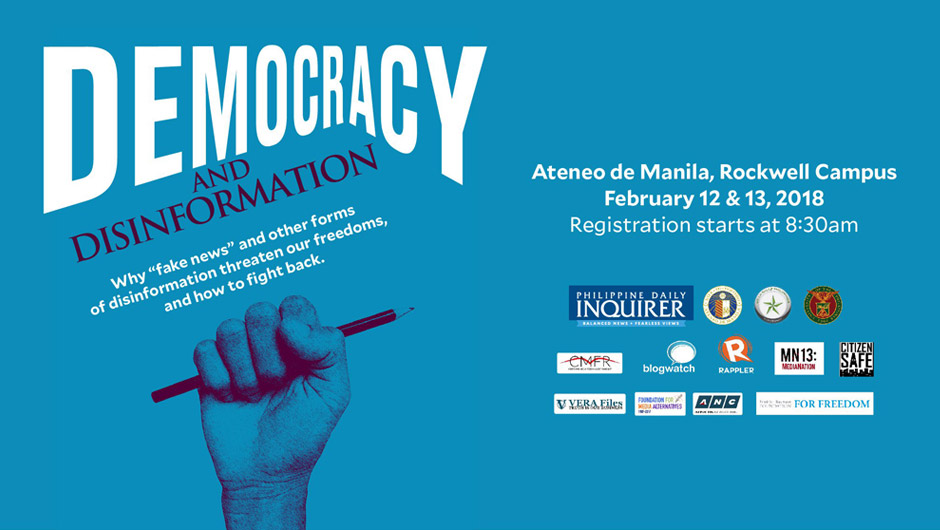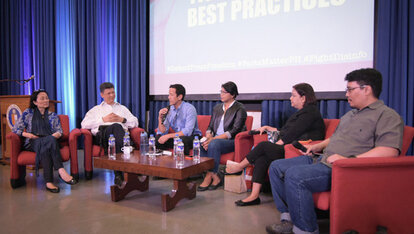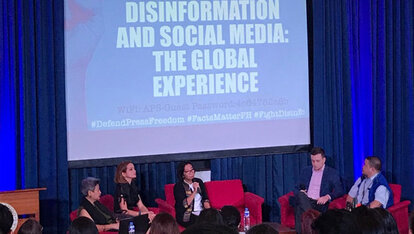Fighting Fake News, Defending Democracy

Together with a wide consortium of media organizations, top universities and civil society groups, FNF Philippines supported the “Democracy and Disinformation Forum”, an international conference that discusses why “fake news” and other forms of disinformation threaten freedoms, and finds ways on how to fight back.
The 2-day forum, which took place on 12 & 13 February 2018 at the Ateneo de Manila University, featured short talks, panel discussions, and break-out workshops—to define the problem of disinformation properly, frame the discussion responsibly, and propose possible solutions or alternatives realistically. It gathered bloggers and journalists, communication professionals and digital influencers, scholars and civil society advocates, student leaders and campus writers, politicians and public officials.
“We shared the sense of a growing number of Filipinos that our country is on a crisis point—when disinformation is rampant, democracy itself is at risk,” said John Nery, Associate Editor of the Philippine Daily Inquirer and Co-Convener of Media Nation. He emphasized that the answers or solutions to the pressing issues would only be effective if it’s done collectively.

Cherian George, Professor in the Department of Journalism at Hong Kong Baptist University explained, “the internet has extremely little to do with it. It is underestimating the skill of the propagandists. We're dealing with multi-platform, multi-skilled, phenomena. The challenge is to be aware of it and match them step by step.”
Both locally and globally threats to democracy, more ostensibly depicted by curtailing freedom of speech, are becoming a trend. Peter Greste, Journalism Professor at the University of Queensland in Australia and former Al-Jazeera reporter who was imprisoned while covering protests in Egypt shared, “governments have been using national security as an opportunity to rollback all sorts of democratic reforms – to silence the press, to pass legislations that limit what the press can do. Without serious critical thinking it’s very easy for the public to say, ‘yes, of course, we all need to be safe’,”
Discrediting the “fourth estate” is a breeding ground for fake news. UP Professor Jean Franco imparted her research on the relationship between misogyny and fake news, “misogynist fake news sell—because they strike at what is familiar- the gendered hierarchies to which most of us are socialized. Women and members of LGBT are usually the prime targets.”
One of the most pressing questions has been, how do you make people more discerning? “Education,” Ellen Tordesillas stressed.
Maria Ressa, Rappler’s CEO shared three steps by which people can collectively fight disinformation: “Step out of your apathy. Build your own communities. Collaborate.”

The panelists agreed in unison that technology, which opened opportunities for engagement, should be seized and used to tell the truth. As Greste simply put it, “we have to be ready to engage.”
Head of ABS-CBN News and Current Affairs Division Ging Reyes pointed out, “how do we use technology to fight disinformation? Our audience is now used to consuming our product through social media. We need to adapt as well.”
TV5 news anchor Ed Lingao built on these solutions by stating, "If you want to make a real difference, fight for your right to be online. Don't surrender the space to people who are faceless, nameless, and mindless."
The event’s key note speaker, Supreme Court Justice Marvic Leonen emphasized, “freedom of expression is a guard against government ... it’s really for government.”
FNF Philippines Country Director Wolfgang Heinze highlighted, “The fervor, courage and unity in this room is a silver lining in the battle against disinformation and fake news. More than ever, we realize the value of our fundamental freedoms and rights. We support the collective responsibility to protect these by sustaining the conversations that would lead to solutions.”
FNF is a German non-profit organization that supports human rights, free market and rule of law. It facilitates local and international dialogues and other forms of civic education that aim to uphold freedom and democracy. It operates in more than 60 offices worldwide, and has been in the Philippines since 1986.